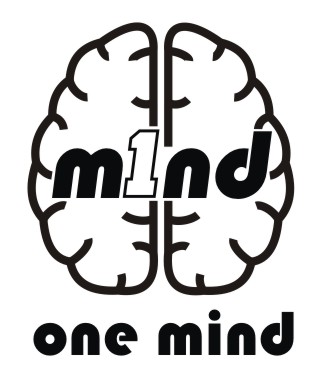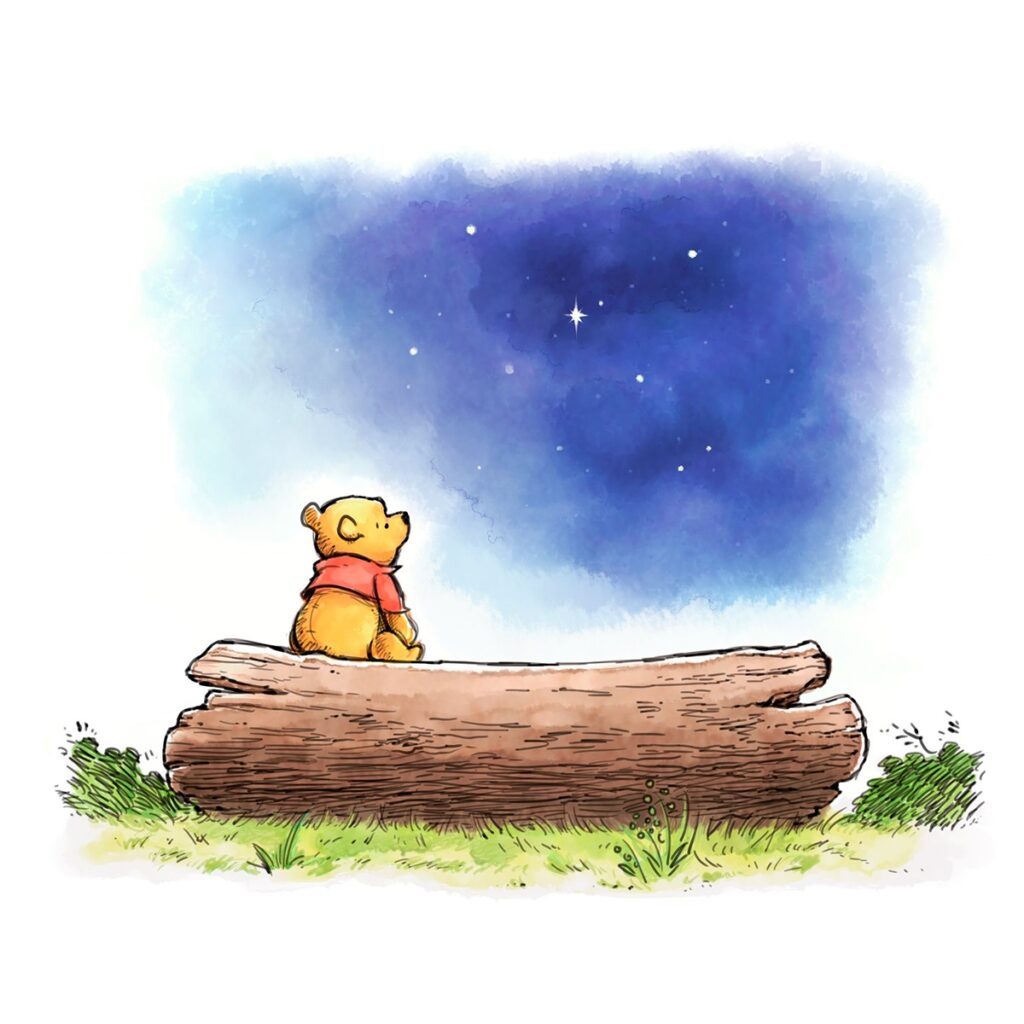
Need a little spark of inspiration? This article is a delightful 2-minute detour. But if you’re enjoying the scenic route today, our menu is packed with even more captivating landscapes to explore.
A message from today’s meditation:
We all know the feeling. The day ends, and you wonder where it all went. Tasks blurred into more tasks, fleeting moments vanished into the ether, and you’re left with a sense that time… has simply… evaporated.
“You can’t save time, you can only spend it. But you can spend it wisely or you can spend it foolishly.” – The Tao of Pooh
Pooh Bear’s reminder for us today is that in every moment we are spending the precious resource called time. We mostly spend it unconsciously, not weighing up whether we’re spending it wisely or wasting it away, so for today’s meditation I want to draw your attention to being present by looking at it in two ways: Being present right now, and being present consistently over time.
Being present – now:
Being present in this moment requires me to let go of my idea of “what this moment should have been”. Subconsciously we always form an expectation of what we’d like a moment to be, this is not “wrong” it’s just what a brain does but if I don’t catch myself I’ll end up spending all my energy on an idea that has followed me from the past, leaving me without energy to deal effectively with the present.
“Things just happen in the right way, at the right time. At least when you let them, when you work with circumstances instead of saying, ‘This isn’t supposed to be happening this way,’ and trying harder to make it happen some other way.” – The Tao of Pooh
Remind yourself, to ask yourself, in as many present moments as you can remember to do this:
- “What does this moment require of me?”
- “What does this moment ask me to step up and do?”
- “What does this moment make available to me?”
Being present – over time:
I’m looking over the span of my lifetime (so far), and I’m asking myself, “what do I spend most of my time doing?”
We are always chasing some kind of goal – and goals are not bad – but we have to realize that our goals are often what dictates how we spend our time, and by the end of our lives we’ll have a small collection of goals reached, but we will have spent an inordinate amount of time in the process of chasing those goals. This process shapes us! Who are you becoming in your process?
How we spend our time is who we become and at the end of our lives we will have become the sum total of the processes we were involved in.
“The Christmas presents once opened are Not So Much Fun as they were while we were in the process of examining, lifting, shaking, thinking about, and opening them. Three hundred sixty-five days later, we try again and find that the same thing has happened. Each time the goal is reached, it becomes ‘Not So Much Fun’, and we’re off to reach the next one, then the next one, then the next.
That doesn’t mean that the goals we have don’t count. They do, mostly because they cause us to go through the process and it’s the process that makes us wise, or happy, or whatever. If we do things in the wrong sort of way, it makes us miserable, angry, confused, and things like that. The goal has to be right for us, and it has to be beneficial, in order to ensure a beneficial process. But aside from that, it’s really the process that’s important.” – The Tao of Pooh
“The honey doesn’t taste so good once it is being eaten; the goal doesn’t mean so much once it is reached; the reward is not so rewarding once it has been given. If we add up all the rewards in our lives, we won’t have very much. But if we add up the spaces *between* the rewards, we’ll come up with quite a bit. And if we add up the rewards *and* the spaces, then we’ll have everything – every minute of the time that we spent.” – The Tao of Pooh
Look at the process you’re involved in and ask yourself:
- Am I more often present in this process, or am I more often on autopilot?
- What kind of a person is this process creating, do I feel like I’m becoming more of myself, or am I losing myself?
- If I don’t reach my goals in the ways I thought I would, will I be happy with who this process made me?
Whatever moment I find myself in, I’ll either be foolishly wasting my units of time being in resistance to what this moment is, or I’ll be spending it wisely in the process of creating the human that I am happy to be.
Wishing you a sense of presence in your life.
– pierre –
Today’s LIVE meditation is: The power of NOW.
(credit: https://www.benjaminhoffauthor.com/ )

A moment of reflection
(If you have the time, use this question as a journal prompt, because whenever you put pen to paper you’re wiring the neural pathways that create your new habits. But if you don’t have the time, just take a moment to reflect on your response.)
The author highlights that “how we spend our time is who we become,” emphasizing the importance of the process over just the goal. Consider a significant goal you are currently pursuing. What kind of person are you becoming through the process of working towards this goal? Are you content with this evolution, regardless of whether you fully achieve the goal as initially envisioned?
Today’s LIVE meditation

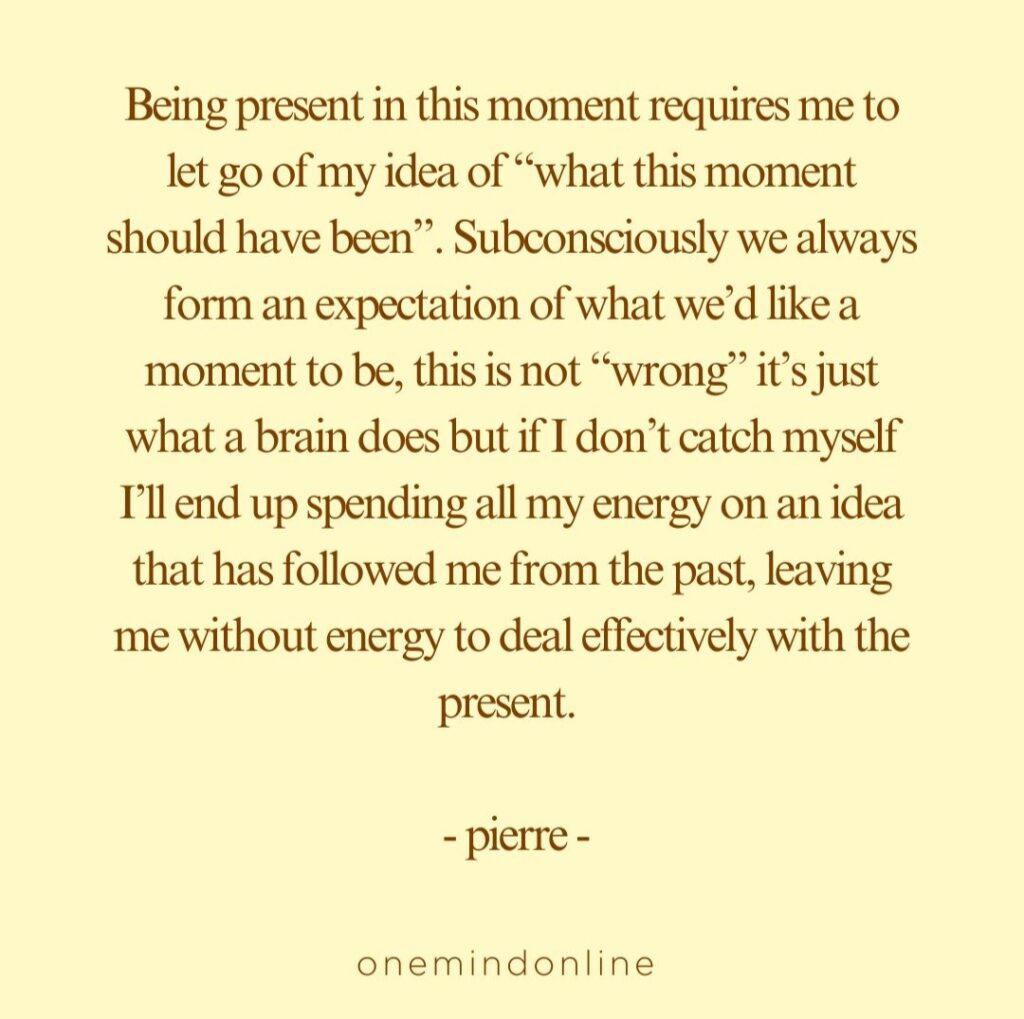
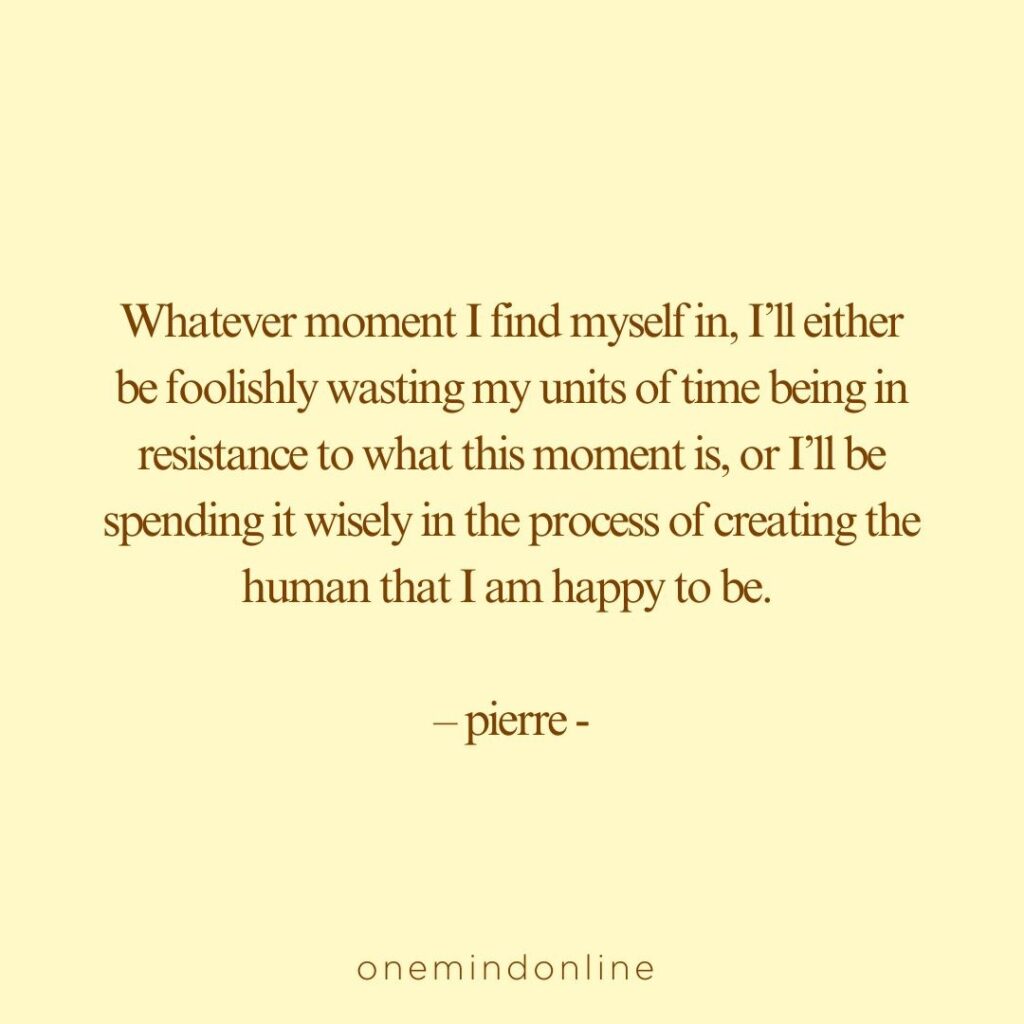

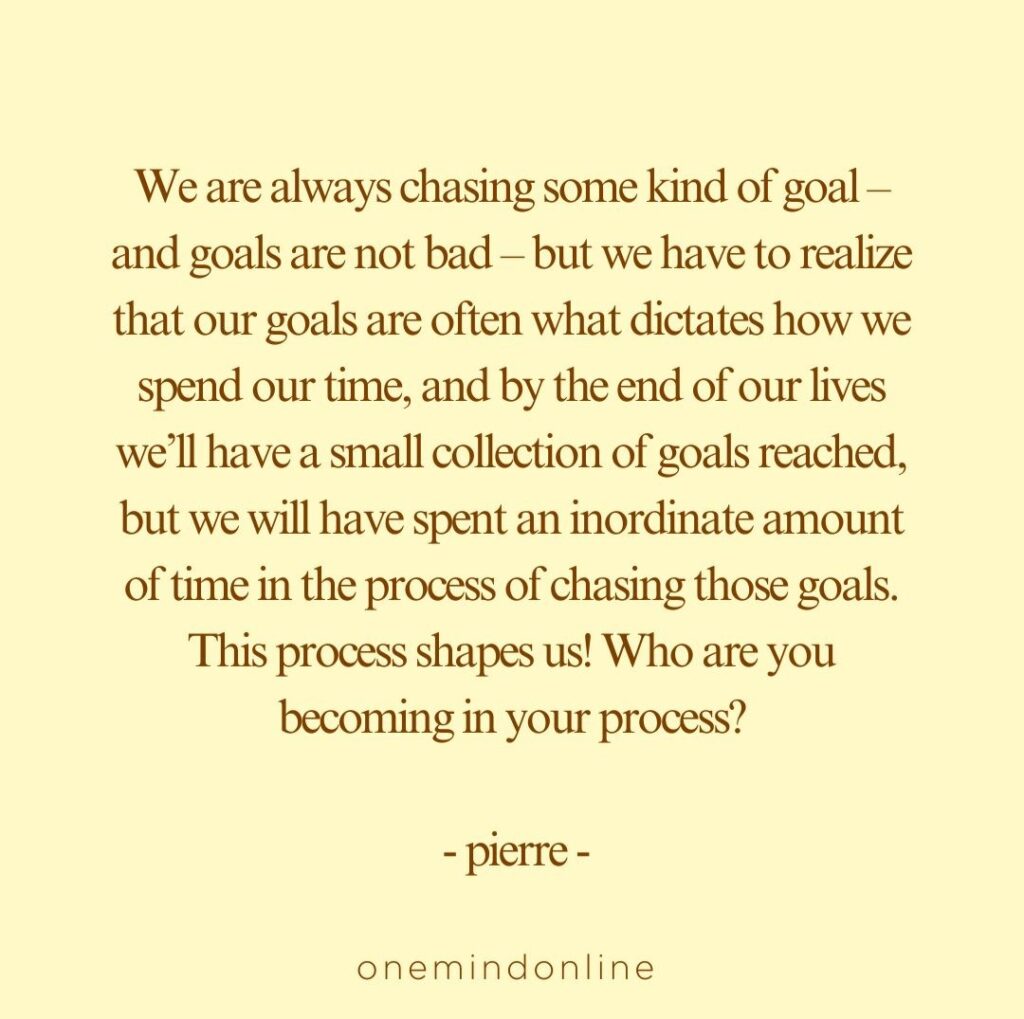




Q&A for deeper learning
1: The article mentions we can’t save time, only spend it. What’s the key takeaway from this idea?
The key takeaway is to be more conscious and intentional about how we use our time. Since it’s a finite and unrecoverable resource, we should strive to “spend it wisely” rather than letting it slip away unconsciously or “foolishly” on things that don’t align with our values or contribute to our well-being.
2: What does it mean to be “present – now” according to the article?
Being “present – now” involves letting go of our preconceived notions of how a moment should be. Our brains naturally create expectations, but being present means recognizing these expectations and not letting them consume our energy, allowing us to engage more effectively with the reality of the current moment.
3: The article suggests asking ourselves certain questions in the present moment. What are they, and what’s their purpose?
The questions are: “What does this moment require of me?”, “What does this moment ask me to step up and do?”, and “What does this moment make available to me?”. Their purpose is to shift our focus from resistance or expectations to active engagement with the current situation, prompting us to respond thoughtfully to what’s unfolding.
4: What does it mean to be “present – over time” as discussed in the article?
In the article, being “present – over time” is contrasted with being present in a specific moment. Being present – over a long period of time – discusses how we spend the majority of our lives in the pursuit of goals. It encourages us to recognize that the process of chasing these goals shapes who we become, and to consider whether we are being mindful and intentional throughout this longer-term journey.
5: The article quotes The Tao of Pooh regarding the excitement of unopened Christmas presents. How does this relate to our goals?
This analogy illustrates that often the anticipation and the process of working towards a goal can be more fulfilling and formative than the achievement of the goal itself. Once a goal is reached, its initial excitement can fade, and we move on to the next. The real value lies in the journey and who we become along the way.
6: What are some key questions the article suggests asking ourselves when reflecting on the processes we are involved in?
The key questions are: “Am I present in this process, or am I on autopilot?”, “What kind of a person is this process creating, am I growing or breaking?”, and “If I don’t reach my goals in the ways I thought I would, will I be happy with who this process made me?”. These questions encourage us to evaluate the impact of our activities on our present awareness and personal growth.
7: What is the ultimate choice we face in any given moment, according to the article’s conclusion?
The ultimate choice is whether to “foolishly waste” our time by resisting the present moment, or to “spend it wisely” by engaging with the process of becoming the person we want to be. It’s a choice between resistance and conscious creation of our character.
